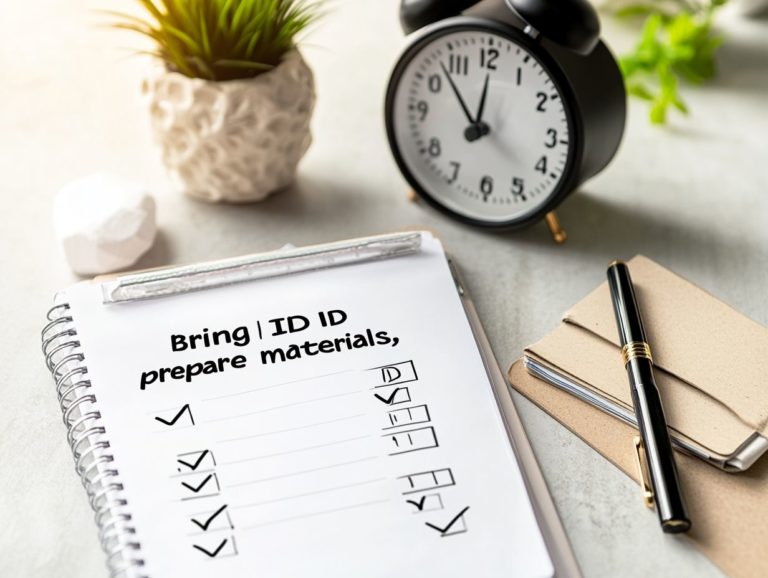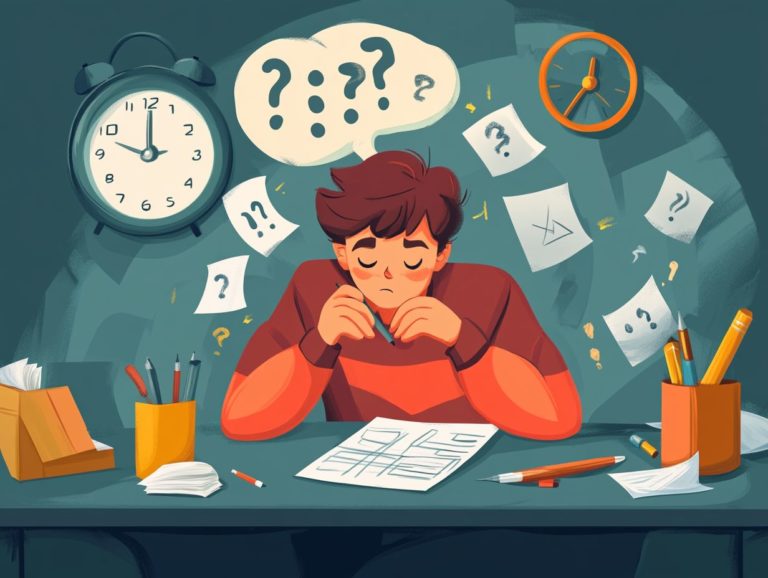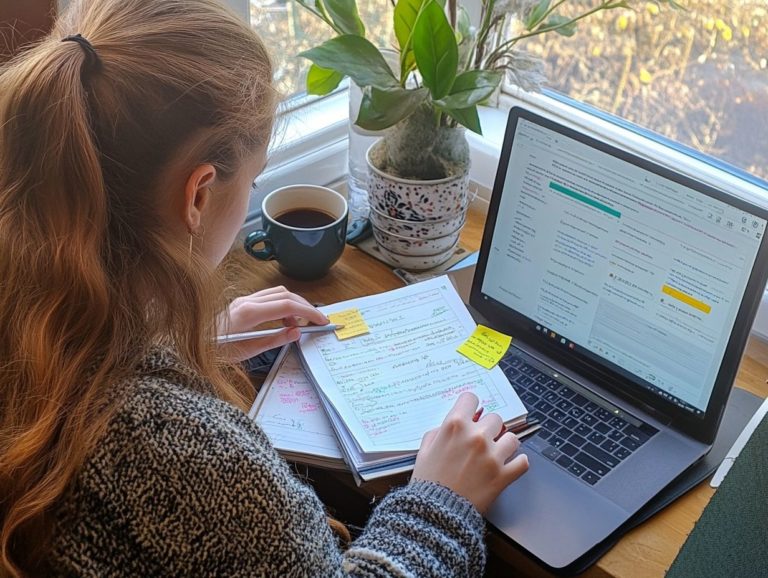how to break down complex test questions
Navigating complex test questions might feel overwhelming, but don t worry! With the right approach, you ll tackle them confidently. This article delves into various types of complex questions and equips you with strategies to break them down effectively.
By identifying key phrases and utilizing the process of elimination, you ll discover valuable tools to achieve success. This article covers effective study habits as well. It familiarizes you with different test formats and offers tips to manage any test anxiety you might experience.
Prepare to elevate your test-taking skills to new heights!
Contents
- Key Takeaways:
- Understanding Complex Test Questions
- Breaking Down the Question
- Strategies for Answering Complex Test Questions
- Preparing for Complex Test Questions
- Overcoming Test Anxiety
- Frequently Asked Questions
- How can I break down tricky test questions?
- Why is it important to break down complex test questions?
- Can breaking down complex test questions help with time management?
- Should I re-read the question after breaking it down?
- What strategies can I use to break down complex test questions?
- How can I practice breaking down complex test questions?
Key Takeaways:
- Break down complex questions by identifying key words and clarifying what s being asked.
- Use the process of elimination to find the best answer.
- Develop solid study habits to prepare effectively.
Understanding Complex Test Questions
Understanding complex test questions is essential for your exam preparation. This is especially true in subjects that demand strong problem-solving abilities and critical thinking skills.
These intricate questions challenge you to go beyond mere recall; they require you to apply your knowledge in unfamiliar situations. Whether it s multiple-choice questions, essay prompts, or problem-solving exams, each type calls for distinct study strategies and test-taking techniques.
By recognizing the various question types, you can approach your studies with a focused mindset. This ultimately boosts your performance across multiple subjects and enriches your overall educational journey.
Types of Complex Test Questions
Complex test questions come in three types: green light, yellow light, and red light questions. Each type evaluates your knowledge in different ways.
Green light questions typically take the form of multiple-choice formats, allowing for a swift assessment of your understanding of concepts with clear, defined answers. Yellow light questions often appear in essay format, encouraging deeper thinking and critical analysis. They give you the freedom to articulate your thoughts in a structured manner.
Then there are red light questions, which include quantitative problems that test your ability to apply mathematical concepts to real-world situations. These require a comprehensive understanding of the material at hand.
This classification enhances the assessment experience and provides educators with valuable insights into various cognitive levels. This allows for tailored feedback and support that meets your specific needs.
Breaking Down the Question
Breaking down complex exam questions is an essential skill that enables you to identify key elements, grasp the underlying problems, and clarify the questions. Learning how to handle difficult questions on tests ultimately enhances the accuracy of your responses.
When you encounter challenging exam questions, systematically dissecting them can significantly boost your performance. This method allows you to evaluate potential answers more effectively and prioritize your approach during the exam.
By adopting this strategy, you gain a clearer understanding of each question’s core requirements. You also improve your ability to recall relevant details and apply study techniques that align seamlessly with the nature of the questions.
Identifying Key Words and Phrases
Identifying key words and phrases within exam questions can significantly elevate your understanding of the problem at hand. This enables you to formulate precise responses. These key elements act as navigational aids, guiding you toward the heart of what is being asked and enhancing your critical thinking skills.
For instance, when you encounter terms like “analyze” or “evaluate,” it signals you to move beyond simple recall, inviting a deeper exploration of concepts. Similarly, words such as “compare” or “contrast” urge you to closely examine the similarities and differences at play, resulting in more nuanced responses.
Recognizing modifiers like “only” or “most” further hones your focus, spotlighting the essential details necessary for addressing the question. By mastering the art of identifying these phrases, you cultivate a sharper analytical mindset that boosts your exam performance and enriches your overall comprehension and retention of the material.
By mastering these skills, you’ll not only tackle complex test questions with ease, but you’ll also enhance your overall learning experience!
Clarifying the Question
Clarifying the question is essential when tackling complex exam questions. It ensures you fully understand what is being asked before you start answering.
By using techniques like rephrasing the question or summarizing it in simpler terms, you can distill the essence of what s presented to you. This proactive approach reduces misunderstandings and enhances your ability to evaluate potential answers.
Taking the time to dissect the wording and pinpoint key components gives you a clearer understanding of the underlying issues. This process helps you focus your responses more effectively, making it easier to address specific requirements and craft well-rounded answers.
Strategies for Answering Complex Test Questions
Using good strategies for tackling complex test questions can markedly elevate your performance, especially during high-stakes assessments.
One of the most beneficial techniques is the elimination method, where you discard incorrect answers to streamline your choices. Prioritizing questions based on your confidence can make a big difference.
Use these test-taking strategies to focus on questions you can manage effectively. This will help reduce anxiety and boost your performance!
Elimination Method
The elimination method is a powerful strategy for tackling multiple-choice questions. It allows you to systematically narrow down your options and significantly boost your chances of selecting the correct answer.
By carefully analyzing each choice and pinpointing the least likely answers, you can concentrate on the more plausible options. For example, when faced with a question about a historical event, you might quickly identify certain options as completely unrelated facts, enabling you to eliminate them right away.
This strategy sharpens your focus and fosters strategic thinking. On a psychological level, using the elimination method enhances your confidence in decision-making while reducing the stress of high-stakes testing situations.
Process of Elimination
The process of elimination is vital for effective studying and test-taking strategies. It allows you to evaluate answers and pinpoint the most accurate option available.
By systematically ruling out incorrect answers, you sharpen your focus on the remaining choices, boosting your chances of success.
For example, in a multiple-choice math exam, you might encounter a challenging question where two options contradict what you ve learned. Identifying these discrepancies allows for easy elimination.
In a history test, if a question demands a specific date, recalling key events can effectively narrow down your options. This strategy helps you select the correct answer and enhances your overall understanding and retention of the material.
Preparing for Complex Test Questions
Preparing for complex test questions requires you to adopt effective study habits and techniques, along with practice and a thorough familiarity with the exam format, to ensure comprehensive preparation.
You can leverage resources like concept maps and flashcards to distill the material and commit key concepts to memory.
By embracing active learning strategies and practicing writing tests, you ll be better equipped to tackle various exam questions, including essay and quantitative formats. This approach enhances your ability to respond and fosters a deeper understanding of the subject matter.
Effective Study Habits
Developing effective study habits is crucial for mastering complex test questions. It significantly enhances your ability to retain and recall information.
Incorporating techniques like concept mapping allows you to visually organize information, making it easier to understand the relationships between ideas.
Flashcards are a powerful tool for active recall, encouraging regular review and reinforcing your memory.
Summarizing notes helps distill large amounts of information into manageable pieces, enhancing your comprehension.
These strategies aid in grasping key concepts and boost your confidence during assessments. As you adopt these practices, you ll be better equipped to tackle challenging material and elevate your overall academic performance.
Practice and Familiarization with Test Format
Regular practice and getting comfortable with the test format is essential for your exam prep. This helps you feel at ease with the types of questions you ll face.
Familiarizing yourself with the material reduces stress on test day. It also helps you manage your time effectively during the exam.
Using various study resources like online quizzes, study groups, and past exam papers can significantly boost your readiness. Create a study schedule that includes regular self-assessment to identify areas needing more focus.
Overcoming Test Anxiety
Managing test anxiety is crucial for performing well during exams. There are several strategies you can use to stay focused and manage your time.
Practice relaxation techniques, prepare thoroughly, and get to know the test format. These steps can boost your confidence and help you do your best.
Addressing your anxiety proactively leads to a clearer mind, setting you up for a more successful and less stressful experience.
Tips for Reducing Test Anxiety
Implementing specific strategies can help you manage stress and approach assessments confidently. Techniques like deep breathing and positive affirmations can create a calming atmosphere that boosts your focus.
Effective time management is key. Scheduling study sessions well in advance allows for thorough preparation, leading to lower anxiety levels.
Consistent practice through mock tests helps you get familiar with the test format. Believe in your abilities to boost your self-esteem and tackle challenges head-on.
Frequently Asked Questions
How can I break down tricky test questions?
Start by reading the question carefully to identify the main topic. Then, break it into smaller parts and make sure you understand each part.
Why is it important to break down complex test questions?
This approach helps you grasp what s being asked and allows you to organize your thoughts. It leads to a clearer and more complete answer.
Can breaking down complex test questions help with time management?
Absolutely! Breaking down a question saves time by helping you focus on specific information and avoiding distractions. Work through the question more efficiently this way.
Should I re-read the question after breaking it down?
Yes! Re-reading ensures you understand the question correctly and haven t missed important details. It also helps you spot any mistakes.
What strategies can I use to break down complex test questions?
Try the “PEEL” method: Point, Evidence, Explanation, and Link. Identify the main point, provide supporting evidence, explain your reasoning, and connect it back to the main point. You can also use diagrams or charts for better organization.
How can I practice breaking down complex test questions?
Take practice tests or create your own questions to break down. Work on past exams and seek feedback from a teacher or tutor on your approach.






